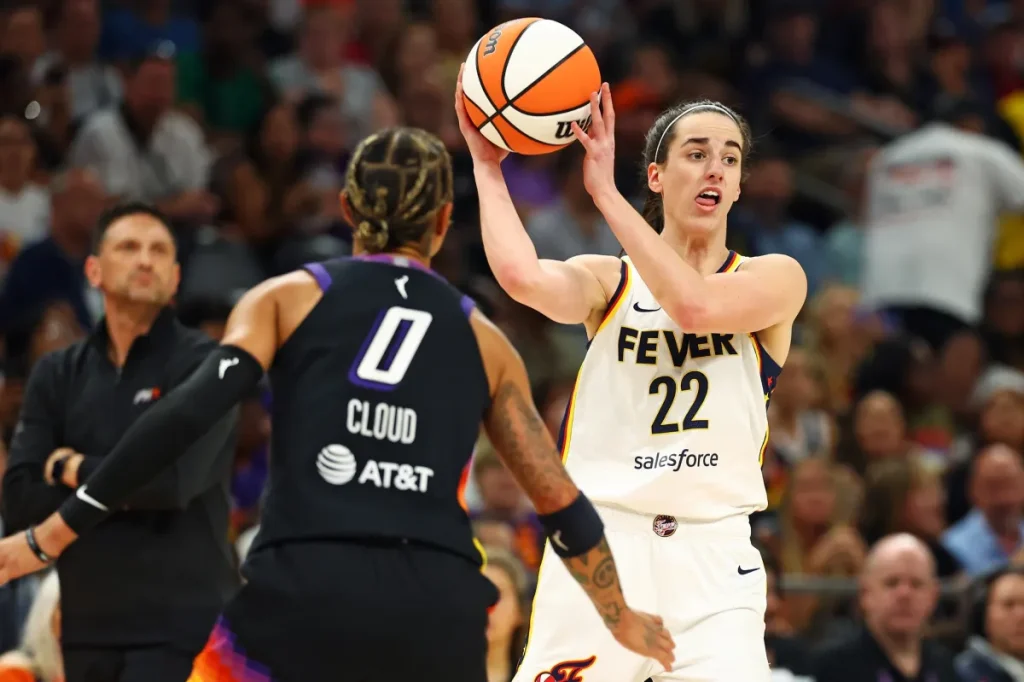In a shocking turn of events, Natasha Cloud, the outspoken Washington Mystics star, has publicly criticized Caitlin Clark, the WNBA’s new phenom, following what many are calling an unexpected attack on her character. Cloud, known for her bold opinions and leadership on the court, fired back at Clark after the latter’s explosive rise in the WNBA, calling her out on several points regarding her play style, leadership, and the media’s overwhelming praise of the young guard.
Cloud didn’t mince words in her comments about Caitlin Clark. In a series of heated posts on social media, she accused Clark of being a “media darling” who has received preferential treatment in the media despite having a less-than-ideal performance in critical moments. Cloud, known for her competitive nature, took particular issue with the fact that Clark’s popularity and media coverage have eclipsed that of other seasoned WNBA players, sparking heated debate among fans and players alike.
“Let’s be real. The hype around Caitlin Clark is insane, and the way she’s being positioned as the face of the league is a joke,” Cloud wrote. “The league has had greats before her. You can’t just throw her on a pedestal because she can shoot a deep three. There are players who have been putting in work for years and deserve more respect.”
Many fans and analysts were taken aback by Cloud’s comments, given her position as a leader in the league and her close relationships with many of the WNBA’s stars. However, some also agreed with Cloud’s sentiment, arguing that while Clark is undoubtedly talented, her meteoric rise has been propelled more by media hype than her actual achievements on the court.
Adding fuel to the fire, ESPN recently released their updated list of the greatest WNBA players of all time, and surprisingly, Caitlin Clark was absent from the top rankings, despite her breakout performance and immediate impact on the league. The snub has sent shockwaves through the basketball community, as many expected Clark, following her dominant college career and quick success in the pros, to earn a spot among the WNBA’s elite players.
Cloud, who has never shied away from controversy, was quick to point out the irony of ESPN’s oversight, particularly given the media’s incessant coverage of Clark. “It’s wild how someone can get all this attention and yet still be ignored by the league’s own all-time rankings,” Cloud remarked. “People have been hyping Caitlin up like she’s already done everything, but the league’s voters clearly aren’t buying into the hype just yet.”

Some fans, however, pointed out that while Clark’s impact has been undeniable, her career is still in its early stages, and such lists are typically reserved for those who have had sustained success over many seasons. ESPN’s omission of Clark from the list has led to passionate debates, with some fans accusing the network of overlooking her potential due to their own biases, while others argue it’s simply a reflection of her relatively short time in the league.
While Cloud’s attack on Clark has sparked controversy, it also highlights a larger issue that has been brewing in the WNBA for years: the transition from the old guard to the new generation. As players like Sue Bird and Diana Taurasi step back from the game, the league is entering a new era dominated by younger stars like Clark, Sabrina Ionescu, and others.
The tension between the established stars and the rising talents like Clark is palpable. Natasha Cloud’s comments seem to echo a larger sentiment that some players feel sidelined in favor of younger, more marketable stars. It raises an important question about how the league, media, and fans prioritize talent versus star power.

In response to Cloud’s criticism, fans have pointed out that Caitlin Clark’s success shouldn’t be discounted just because she’s benefiting from the media attention that has historically been lacking in women’s sports. Clark’s ability to connect with a wider audience, increase viewership, and attract new fans to the WNBA is undeniable. However, the question remains: does the hype around Clark overshadow the hard work of long-time stars who have helped build the league into what it is today?
As the drama unfolds, one thing is clear: the rivalry between the old guard and the new wave of stars in the WNBA is intensifying. Natasha Cloud’s outspoken attack on Caitlin Clark and the ESPN all-time list snub are only the beginning of what could be a larger conversation about respect, legacy, and the evolving landscape of women’s basketball.
As fans and players continue to debate the validity of Cloud’s accusations, one thing is certain — the future of the WNBA is in flux, and it will take a lot more than media attention to define the true legends of the game. The world is watching, and as this saga unfolds, only time will tell whether Caitlin Clark can live up to the enormous expectations placed upon her or if the voices of veterans like Natasha Cloud will force a reevaluation of what it truly means to be a legend in the WNBA.
The WNBA’s future is wide open, and with players like Cloud calling out the system, the league is poised for even more heated debates in the coming months.
